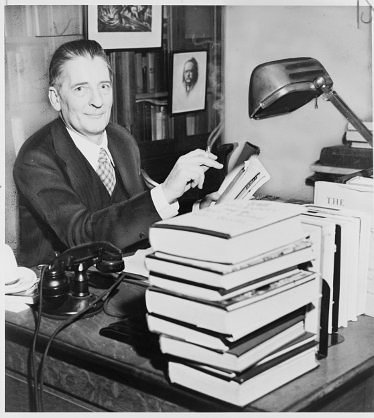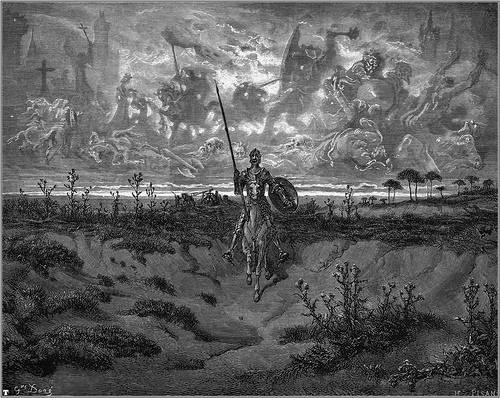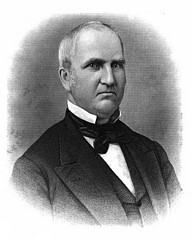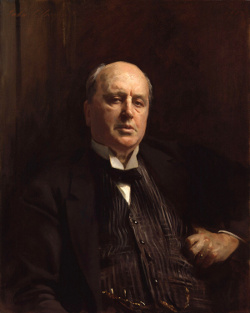- River Phoenix was born River Bottom.
- Every natural number is the sum of four squares.
- What happens if Pinocchio says, “My nose will grow now”?
- Shakespeare has no living descendants.
- “All generalizations are dangerous — even this one.” — Dumas
Literature
To Do

While editing The Sun Also Rises, Maxwell Perkins had to decide how to handle the many obscenities in Hemingway’s text. He planned a lunch with the author and kept a list of words to discuss with him.
While Perkins was at lunch, Charles Scribner came looking for him and, finding his office empty, consulted his calendar. It read “shit piss fuck bitch.”
When Perkins returned, Scribner said, “You must be exhausted.”
Summation
In his Notebooks, Samuel Butler tells a story of Herbert Clarke’s 10-year-old son:
His mother had put him to bed and, as he was supposed to have a cold, he was to say his prayers in bed. He said them, yawned and said, ‘The real question is whether there is a God or no,’ on which he instantly fell into a sweet and profound sleep which forbade all further discussion.
Elsewhere Butler wrote, “What is faith but a kind of betting or speculation after all? It should be, ‘I bet that my Redeemer liveth.'”
Hate Mail
In Ralph Roister Doister (1553), Ralph asks a scrivener to compose a love letter to Dame Christian Custance. But when Matthew Merrygreek reads it for her, Dame Custance is shocked to hear an insulting diatribe. This is certainly not what Ralph intended, but the scrivener confirms that he copied the letter accurately, and Merrygreek read it verbatim and in full. What’s going on here?
Sweet mistress, whereas I love you nothing at all–
Regarding your substance and richness chief of all–
For your personage, beauty, demeanour and wit,
I commend me unto you never a whit.–
Sorry to hear report of your good welfare,
For (as I hear say) such your conditions are,
That ye be worthy favour of no living man,
To be abhorred of every honest man,
To be taken for a woman inclined to vice,
Nothing at all to virtue giving her due price.–
Wherefore, concerning marriage, ye are thought
Such a fine paragon, as ne’er honest man bought.–
And now by these presents I do you advertise
That I am minded to marry you in no wise.–
For your goods and substance, I can be content
To take you as ye are. If ye mind to be my wife,
Ye shall be assured, for the time of my life,
I will keep you right well from good raiment and fare–
Ye shall not be kept but in sorrow and care–
Ye shall in no wise live at your own liberty.
Do and say what ye lust, ye shall never please me;
But when ye are merry, I will be all sad;
When ye are sorry, I will be very glad;
When ye seek your heart’s ease, I will be unkind;
At no time in me shall ye much gentleness find,
But all things contrary to your will and mind,
Shall be done–otherwise I will not be behind
To speak. And as for all them that would do you wrong,
I will so help and maintain, ye shall not live long–
Nor any foolish dolt shall cumber you but I.
I, whoe’er say nay, will stick by you till I die.
Thus, good mistress Custance, the Lord you save and keep;
From me, Roister Doister, whether I wake or sleep–
Who favoureth you no less, ye may be bold,
Than this letter purporteth, which ye have unfold.
Donkeyshines

In Don Quixote, when Sancho Panza’s ass is stolen, Quixote sympathizes and the two ride on … Sancho somehow “sitting side-ways on his ass.” In the next chapter he laments its loss again: “It may be well to saddle Rocinante again, that he may supply the loss of my Dapple.”
Sancho also leaves his wallet at an inn and loses his cloak and the food it contains. Yet later he discovers the food on the ass … and puts gold in his wallet.
Strangely, these errors appear in the novel’s second edition but not the first. No one knows how this happened; possibly it’s a compositor’s error, or perhaps Cervantes added a page without weaving it into the narrative.
See Cast Away.
Running On

Cushing Biggs Hassell’s thousand-page History of the Church of God (1886) is notable for a single sentence — this one, on page 580, beginning “The nineteenth is the century …”
It’s six pages long, with 3,153 words, 360 commas, 86 semicolons, and six footnotes. Many regard it as the longest legitimate sentence ever published in a book.
Essentially it’s one long indictment of the 19th century, proving for Hassell that “after all our progress, this is still a very sinful and miserable world.” Why he felt he had to show this in a single sentence is not clear.
A Swarm of Words

Despite his literary brilliance, Henry James was absurdly prolix in his daily life. Reportedly he once asked a waiter to “bring me … fetch me … carry me … supply me … in other words (I hope you are following me) serve–when it is cooked … scorched … grilled I should say–a large … considerable … meaty (as opposed to fatty) … chop.”
Once while motoring through England with Edith Wharton, James lost his way and hailed an old man at the side of the road. “My good man, if you’ll be good enough to come here, please; a little nearer–so. My friend, to put it to you in two words, this lady and I have just arrived here from Slough; that is to say, to be more strictly accurate, we have recently passed through Slough on our way here, having actually motored to Windsor from Rye, which was our point of departure; and the darkness having overtaken us, we should be much obliged if you would tell us where we now are in relation, say, to the High Street, which, as you of course know, leads to the Castle, after leaving on the left hand the turn down to the railway station.”
The old man looked blank. “In short, my good man,” said James, “what I want to put to you in a word is this: Supposing we have already (as I have reason to think we have) driven past the turn down to the railway station (which in that case, by the way, would probably not have been on our left hand, but on our right), where are we now in relation to–”
“Oh, please,” said Wharton, “do ask him where the King’s Road is.”
“Ah–? The King’s Road? Just so! Quite right! Can you, as a matter of fact, my good man, tell us where, in relation to our present position, the King’s Road exactly is?”
“Ye’re in it,” said the man.
Black and White
‘”No,” she laughed.’ How on earth could that be done? If you try to laugh and say ‘No’ at the same time, it sounds like neighing — yet people are perpetually doing it in novels. If they did it in real life they would be locked up.
— Hilaire Belloc, “On People in Books,” 1910
Misc
- Douglas Adams claimed that the funniest three-digit number is 359.
- Romeo has more lines than Juliet, Iago than Othello, and Portia than Shylock.
- Friday the 13th occurs at least once a year.
- “By nature, men love newfangledness.” — Chaucer
- John was the only apostle to die a natural death.
The Sage of Göttingen
Physicist Georg Christoph Lichtenberg (1742-1799) is not widely remembered outside Germany — which is a great pity, as his notebooks contain some of history’s most trenchant aphorisms:
- “If countries were named after the words you first hear when you go there, England would have to be called Damn It.”
- “What they call ‘heart’ lies much lower than the fourth waistcoat button.”
- “What a pity it isn’t a sin to drink water, cried an Italian, how good it would taste.”
- “A book is a mirror: If an ape looks into it an apostle is hardly likely to look out.”
- “The often unreflected respect for old laws, old customs, and old religion we have to thank for all mischief in the world.”
- “It is we who are the measure of what is strange and miraculous: If we sought a universal measure the strange and miraculous would not occur and all things would be equal.”
- “Just as there are polysyllabic words that say very little, so there are also monosyllabic words of infinite meaning.”
- “If walking on two legs is not natural to man it is certainly an invention that does him credit.”
- “It is almost impossible to carry the torch of wisdom through a crowd without singeing someone’s beard.”
- “Now that education is so easy, men are drilled for greatness, just as dogs are trained to retrieve. In this way we’ve discovered a new sort of genius, those great at being drilled. These are the people who are mainly spoiling the market.”
- “Can it be that the evil in the world is in general of more use than the good?”
The “waste books” were admired by Wittgenstein, Schopenhauer, Nietzsche, and Freud, and even Tolstoy wondered “why the Germans of the present day neglect this writer so much.” He never got an answer.
